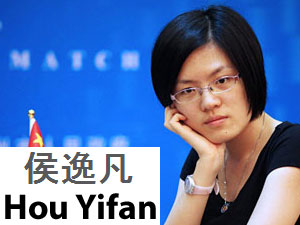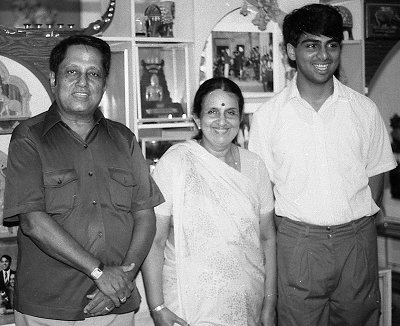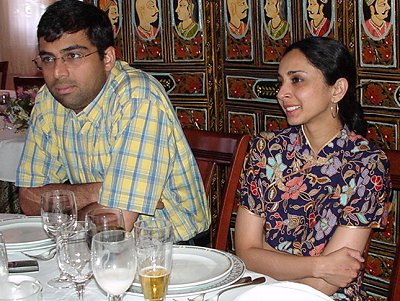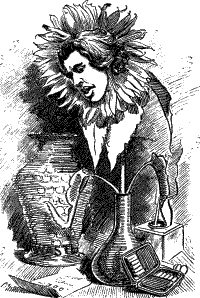


The correct use of Chinese names may be a detail in chess reporting, but it's an issue that concerns one fifth of humanity, not to mention several top players, including the women's champion Hou Yifan (Chinese: 侯逸凡 , which is pronounced like this). I remember some time ago that you published an article explaining how Indian names work. In view of your recent reports, it may be time for one on Chinese names!
One core point: in Chinese the surname comes first. Mao Zedong's (Mao Tse-tung) surname was Mao, and the old Chinese revolutionary Sun Yat-sen was from the Sun family, not the “Yat-sen” clan, which does not exist.
Because Hou Yifan's surname is Hou, your discussion of "Kosteniuk, Kosintseva, and Yifan" in recent articles must sound as dissonant to a Chinese as "Clinton, Bush, and Barack" would to an English speaker. The same can be said of your recent headline “Mind Games Day 5: Yifan, Karjakin gold.”
Calling Hou Yifan "Yifan" is not inherently wrong, because she is still young and you sometimes refer to A. Kosteniuk simply as "Alexandra". But unless you are willing to write "Yifan, Sergey gold," you might as well stick with "Hou Yifan" or, less preferably, "Hou" (because Chinese names are short, they are rarely taken apart.)
If you want a quick rule of thumb, let's just say that in most Chinese names the two-syllable part is the personal name. This is true for Hou Yifan, Ju Wenjun, Bu Xiangzhi, etc. There are exceptions – Sima Qian, who compiled the "Records of the Grand Historian" more than 2,000 years ago is a famous one – but as far as I know, there are no well-known Chinese chess players with a compound surname like Sima.
Now you may wonder what to make of names like Wang Yue, which have no disyllabic component. Well as usual, the surname comes first: Wang Yue and Wang Hao are both surnamed Wang. So is Hou Yifan's mother Wang Qian (Chinese women keep their maiden name even after marriage), but they are almost certainly unrelated, since almost 6% of all Chinese are surnamed Wang!
Note that when you speak or refer to Wang Yue or Zhao Xue, you cannot take their names apart and address them by their personal name only. In China even their parents and close friends would call them "Wang Yue" and "Zhao Xue" (or some nickname), but never "Yue" and "Xue."
I am sure your Chinese readers, who must be numerous and most likely include many players, will be grateful to see that you can now write their names as correctly as those of Indian grandmasters!
In early 2004 there was, on our news page, a discussion of GM Vishy Anand's name. In this connection we decided to provide a short primer on his and other players' names. We reproduce the article here.
"What's in a name? The poet is Wilde, but his poetry's tame."
– Punch, 25th June, 1881
He was named "Anand" at birth, and as a good South Indian Brahmin the name of his father was tagged on, to distinguish him from the hundreds of thousands of other Anands that walk the land. The system is simple: you get a name, one name, and add it to your father's name. This is similar to the Icelandic tradition, except the "son" part (as in Gustavson, Perutursson, etc.) is left out.

Anand with his parents at home in Madras – years before the invention of colour photography
Now Anand's father is Viswanathan, an affable Railway executive who loves golf. So it became Viswanathan Anand, which translates roughly to Viswanathan's son Anand. The spelling is correct, the 's' is usually pronounced "Vish..", which is why the name is sometimes misspelled Vishwanathan. The stress (if any) is on the first syllable: VISH-wah-nah-thaan – with all the 'a's as in the English 'bath'.
Quick IQ quiz: Anand's father is Krishnamurthy Viswanathan. What is Anand's grandfather's name?
Now the correct way to address Anand is as follows:
When Anand first came to visit and stay we all called him Anand (what else?). He was 17 at the time. Some years later – I believe it was during an event in Las Palmas and it was Max Dlugy, but I could be mistaken – I first heard someone refer to him as "Vishy". I thought this was quite rude and asked Anand about it. "No, I'm cool with it", he said. So Vishy it became, and over the years people started calling him Vishy Anand.

Mr and Mrs Anand
When Anand got married his wife Aruna became Aruna Anand. I don't know why in the case of women it appears to be that way around, but I have also heard Anand being referred to as Anand Viswanathan, so maybe it is interchangable. The polite form of address is Mrs Anand, if you know her well you can call her Aruna. (Interestingly her father's name is Ananth, so before her marriage she was Aruna Ananth – talk about minimizing the change!). When they are together Aruna calls him Anand, as in "Aaanand, tell him to stop teasing me!" When she talks about him to other people she may call him Vishy, probably because she knows they will otherwise be confused (Almira Skripchenko once expressed her surprise that Aruna was calling her husband by his surname!).
In Russia your full name comprises a first name (imia); a patronymic (otchestvo); and surname (familiya). A person’s otchestvo is really important to know. My first raw encounter with the system was in the early eighties when I was visiting Moscow with Ken Thompson, the computer chess pionieer scientist who also invented Unix. He came in from New York, I from Hamburg, and we were put into different hotels. Since I could not locate him I decided to call our host, ex world champion Mikhail Botvinnik. I tried, but someone spoke to me in Russian.
So I asked my Intourist guide to call for me. "You want to make phone call with great chess champion Botvinnik?" he asked in disbelief? When I convinced him it was okay he said he would do it, but needed to know Botvinnik's otchestvo. His what? "What is his father name?" he repeated in clarification. "I don't know," I said impatiently, "just call him please." Why did he want to know Botvinnik's father's name?
But my Intourist guide was adamant. He actually went down the street to a bookstore and came back triumphantly with the information he needed to be able to call Botvinnik: Moiseevich, son of Moise (Moses). Without that he simply couldn't call, it would have been too rude to address him as Mr Botvinnik.
This is how the system works:
I use Kimovitch in mock reproach ("You've got to get your act together, Garry Kimovitch!") or if I am really, really impressed by something, like when he has just finished a successful keynote address in front of a thousand computer experts in Barcelona.
Russians of course know how to build patronymics. They simply mean "son (daughter) of" and are formed by adding a suffix to the father's name; -ovich/evich for a boy, -ovna/evna for a girl.
Note that in Joanne Pittaway's article "Ten Years in Ten Days" she respectfully refers to Garry's mother as Klara Shagenovna. Joanne has lived in Russia and knows the system. If Joanne herself were Russian her name would be Zhanna Mikhailovna Pittaway, since her father's name is Michael. To illustrate further, Joanne’s brother is called Barry, hence his name would be Barry Mikhailovich Pittaway. You can have a lot of fun making yourself sound very Russian by working out your patronymic.
Many of our readers have noticed that lots of Russian surnames end in –ov/-ev, or –iy/oy Kaspar-ov, Kamsk-y. The more observant amongst them have also noticed that women’s’ surnames end differently; -ova/-eva, or –aya.
When a surname ends in ov/ev it is simply treated like a noun. Feminine nouns end, broadly speaking, in a or ya. Garry Kimovitch Kasparov's wife is Daria (patronymic) Kasparov-a. When Garry’s first daughter was born, she was christened Polina Garrievna Kasparova. Garry also has a son, Vadim. What would his full name be? Answer below.*
Surnames that end in iy/oy have adjectival endings (Dostoyevsk-iy, Tolst-oy). Yes, they are nouns, but the way they change according to gender and case is just like an adjective. The wife of Dostoyevsk-iy would be Dostoyevsk-aya. The daughter of Tolst-oy would be Tolst-aya.
As for the origin of typical Russian surnames; the -ov/-ev is (confusingly) the ending given to nouns in the genitive plural. So, originally these surnames probably meant 'of the family', 'of the region' etc. Maybe it's akin to 'van der' or 'von' in Dutch or German. The adjectival ending surnames were probably formed along the same lines: to describe places/professions/characteristics of ancestors in the mists of time.
It should be remembered that there are other endings for surnames in Russia. Putin, Lenin, Pushkin for instance. Surnames can be different for all sorts of reasons. They can be of foreign in origin, Jewish surnames, Muslim, etc. But usually (if anything can be described as usual in the Russian language), these will be adapted to show the gender of their possessor.
*Garry’s son is called Vadim Garrievich Kasparov.
Icelanders, as mentioned above, are named after their fathers. Magnus Ragnarsson's father's first name would be Ragnar. If Ragnar also had a daughter, her last name would be Ragnarsdottir. Ragnar himself would be named after his father, something like Ragnar Gunnarsson. So people tend to identify each other by first name and even entries in telephone directories would typically be based on first names rather than last names.
Patronyms are also used in Greece, and can tell you from which region a person comes: Peloponese "poulos", e.g. Petropoulos (son of Petros); Crete "akis", e.g. Petrakis (son of Petros); Macedonia "ides", e.g. Petrides (son of Petros); Island of Cephalonia "atos", e.g. Petratos (son of Petros); Mani region os Peloponese "akos", e.g. Petrakos (son of Petros); Asia Minor "oglou", e.g. Petroglou (son of Petros) also used by the Turks. Use this to impress Greek players.
In Spanish culture – at least in Cuba and Puerto Rico – you add your mother’s maiden name to the end of your name. That is the name that is used to look someone up in the phone book. Jorge Menendez becomes Jorge Menendez Donnell, and to find him in the Puerto Rican phone book, one must look under Donnell. Narciso Rabell, who is the FIDE delegate from Puerto Rico, is Narciso Rabell Mendez. However, when you speak with them, you would address them as Jorge Menendez and Narciso Rabell.
The Iranian -zadeh means son of, as in Moshrefzadeh.
In the Arab world fathers will sometimes proudly attach the names of their sons. "Abu" means father of, and Umm means mother of (Ibn means son of, and Bint means daughter of). Abu Bakr and Abu Hamid mean"father of" a son named Bakr or Hamid. This should help you understand why in news reports you will often hear a Palestinian negotiator referred to by name, followed by the additional information, e.g. the new Palestinian Prime Minister, Mahmoud Abbas – commonly known as Abu Mazen...
The Fresian Dutch have '-ma' for son of, as in Anema = son of Ane, Jellema = or son of Jelle.
The Welsh ap or p is a patronym builder. Pritchard comes from ap Richard, son of Richard, and the common Welsh name Pugh is derived from ap Hugh.
Northern Germany had an extensive system of patronymics, with the oldest son getting the name of his paternal grandfather, the second son that of the maternal grandfather, with the first name being the genitive form of the father's name. This complicated system was abolished in 1811 – by Napoleon.
In English we have Johnson, Jackson, Peterson, etc. Fitz- also denotes "son of" (as in Fitzgerald, son of Gerald). But this prefix was frequently used for illegitimate children of aristocrats (e.g. Fitzclarence = son of the Duke of Clarence) and royalty (Fitzroy = son of the king). So Henry Fitzroy, Duke of Grafton, was the bastard son of Charles II and Barbara Villiers, the Duchess of Cleveland. Fitz is the Norman form of the modern French fils = son.
You can learn a lot about patronym in this Wordsmith discussion. Some of the above information was gleaned from that excellent site.
 What's in a name? In 1881 Punch magazine propagated the following jingle, printed as a caption to a caricature of Wilde in front of a giant sunflower, the symbol of the Aesthetic Movement:
What's in a name? In 1881 Punch magazine propagated the following jingle, printed as a caption to a caricature of Wilde in front of a giant sunflower, the symbol of the Aesthetic Movement:
Aesthete of Aesthetes,
What's in a name?
The poet is WILDE,
But his poetry's tame”.
Oscar Wilde himself was not one to hold back. This is what he said about some of his contemporaries: